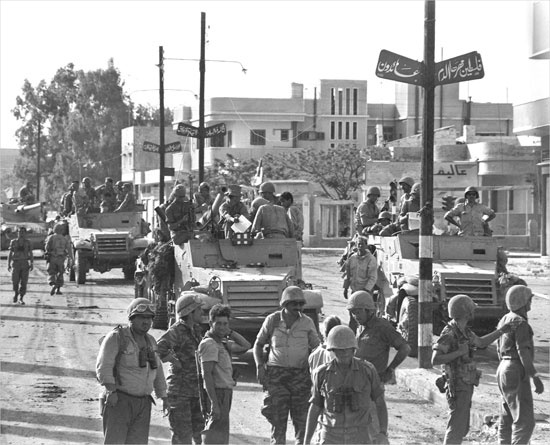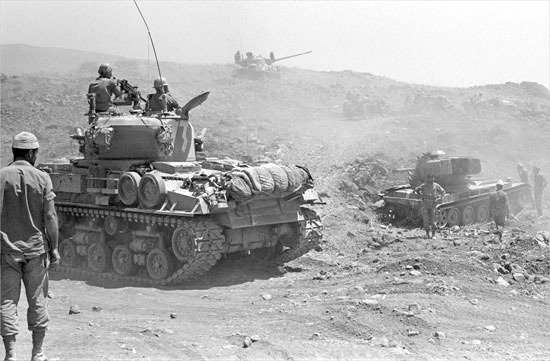Six-Day War
Middle East 【1967】
also called June War or Third Arab-Israeli War
 brief war that took place June 5–10, 1967, and was the third of the Arab-Israeli wars. Israel's decisive victory included the capture of the Sinai Peninsula, Gaza Strip, West Bank, Old City of Jerusalem, and the Golan Heights; the status of these territories subsequently became a major point of contention in the Arab-Israeli conflict.
brief war that took place June 5–10, 1967, and was the third of the Arab-Israeli wars. Israel's decisive victory included the capture of the Sinai Peninsula, Gaza Strip, West Bank, Old City of Jerusalem, and the Golan Heights; the status of these territories subsequently became a major point of contention in the Arab-Israeli conflict.Prior to the start of the war, attacks conducted against Israel by fledgling Palestinian guerrilla groups based in Syria, Lebanon, and Jordan had increased, leading to costly Israeli reprisals. In November 1966 an Israeli strike on the village of Al-Samūʿ in the Jordanian West Bank left 18 dead and 54 wounded, and, during an air battle with Syria in April 1967, the Israeli Air Force shot down six Syrian MiG fighter jets. In addition, Soviet (Union of Soviet Socialist Republics) intelligence reports in May indicated that Israel was planning a punitive military campaign against Syria, and, although inaccurate, the information further heightened tensions between Israel and its Arab neighbours.
Egyptian president Gamal Abdel Nasser (Nasser, Gamal Abdel) had previously come under sharp criticism for his failure to aid Syria and Jordan against Israel; he had also been accused of hiding behind the United Nations Emergency Force (UNEF) stationed at Egypt's border with Israel in the Sinai. Now, however, he moved to unambiguously demonstrate support for Syria: on May 14, 1967, Nasser mobilized Egyptian forces in the Sinai (Sinai Peninsula); on May 18 he formally requested the removal of the UNEF stationed there; and on May 22 he closed the Gulf of Aqaba (Aqaba, Gulf of) to Israeli shipping, thus instituting an effective blockade of the port city of Elat in southern Israel. On May 30, King Ḥussein (Ḥussein) of Jordan arrived in Cairo to sign a mutual defense pact with Egypt, placing Jordanian forces under Egyptian command; shortly thereafter, Iraq too joined the alliance.
 In response to the apparent mobilization of its Arab neighbours, early on the morning of June 5, Israel staged a sudden preemptive air assault and destroyed Egypt's air force on the ground; later that day, it incapacitated a great deal of the Jordanian and Syrian air power as well. Without cover from the air, the Arab armies were left vulnerable to attack, and, as a result, the Israeli victory on the ground was also overwhelming. By the time the United Nations cease-fire came into effect on June 10, Israeli units had driven Syrian forces back from the Golan Heights, taken control of the Gaza Strip and the Sinai Peninsula from Egypt, and driven Jordanian forces from the West Bank. Notably, the Israelis were left in sole control of Jerusalem. The warfare resulted in the creation of hundreds of thousands of refugees and brought more than one million Palestinians in the occupied territories under Israeli rule.
In response to the apparent mobilization of its Arab neighbours, early on the morning of June 5, Israel staged a sudden preemptive air assault and destroyed Egypt's air force on the ground; later that day, it incapacitated a great deal of the Jordanian and Syrian air power as well. Without cover from the air, the Arab armies were left vulnerable to attack, and, as a result, the Israeli victory on the ground was also overwhelming. By the time the United Nations cease-fire came into effect on June 10, Israeli units had driven Syrian forces back from the Golan Heights, taken control of the Gaza Strip and the Sinai Peninsula from Egypt, and driven Jordanian forces from the West Bank. Notably, the Israelis were left in sole control of Jerusalem. The warfare resulted in the creation of hundreds of thousands of refugees and brought more than one million Palestinians in the occupied territories under Israeli rule.- Bogoraz, Vladimir Germanovich
- Bogotá
- Bogra
- bog rosemary
- Bogusławski, Wojciech
- Bo Hai
- Bohdan Khmelnytsky
- Bohemia
- Bohemian Confession
- Bohemian Forest
- Bohemian glass
- Bohemian Massif
- Bohemian-Moravian Highlands
- Bohemian school
- Bohemond I
- Bohemond II
- Bohemond III
- Bohemond IV
- Bohemond V
- Saint Madeleine-Sophie Barat
- Saint Maksymilian Maria Kolbe
- Saint Malachy
- Saint-Malo
- Saint-Malo, Gulf of
- Saint Marcellinus